2017-2018 Events
The Boston University Program in Scripture and the Arts Presents “The Unfolding of Scripture Through Movement”
The Program for Scripture and the Arts is proud to present a brief preview of the speakers featured in this coming year’s events! This posting will be updated as more details about the events become available. Mark your calendars for an exciting year of Scripts!
Self-presentation in Egyptian Funerary Monuments of the Middle Kingdom
Tuesday, April 3rd, 5:00-6:30pm: Dr. Denise Doxey
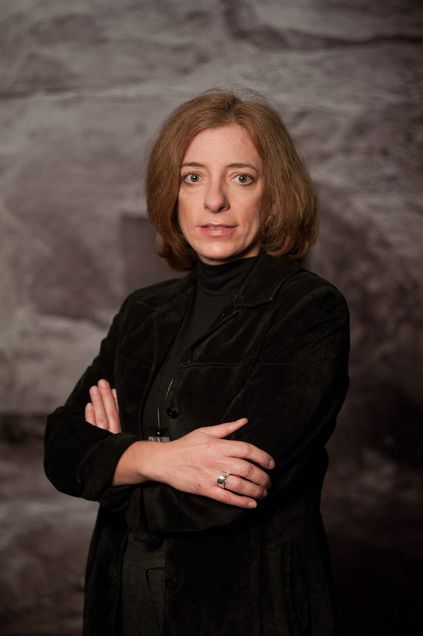 Denise Doxey is Curator, Ancient Egyptian, Nubian and Near Eastern art at the Museum of Fine Arts, Boston. Before joining the staff of the MFA, she was Keeper of the Egyptian Section of the University of Pennsylvania Museum of Archaeology and Anthropology. She completed her B.A. at the State University of New York at Albany, her M.Phil at Oxford University and her Ph.D. at the University of Pennsylvania. She is the author or co-author of four books and nu
Denise Doxey is Curator, Ancient Egyptian, Nubian and Near Eastern art at the Museum of Fine Arts, Boston. Before joining the staff of the MFA, she was Keeper of the Egyptian Section of the University of Pennsylvania Museum of Archaeology and Anthropology. She completed her B.A. at the State University of New York at Albany, her M.Phil at Oxford University and her Ph.D. at the University of Pennsylvania. She is the author or co-author of four books and nu
merous articles on various aspects of Egyptian and Nubian art, archaeology and civilization. She has excavated in Greece and Egypt and has taught Egyptology courses at the University of Pennsylvania and Harvard University. At the MFA, she was the co-curator of The Secrets of Tomb 10A: Egypt 2000 BC and Gold and the Gods: Jewels of Ancient Nubia. She currently serves on the board of ICOM’s International Committee for Egyptology and is president of the New England Chapter of ARCE.
During Egypt’s Middle Kingdom (ca. 2040-1640 BCE), the funerary monuments of regional officials integrated scenes and inscriptions created to demonstrate that they had lived and served in accordance with maat, the concept of justice and world order. Because these officials served as intermediaries between the people of their districts and the central government, tomb scenes portray them as rulers over the local population while, at the same time, offering formulas and autobiographies display humble obedience to the king and, through him, to the gods. Dr. Doxey’s talk will discuss her research into how texts and images were strategically combined to serve as a sort of curriculum vitae for admission to the afterlife, while also exploring their intended audiences, non-royal, royal, and divine.
Event will be held in the Executive Boardroom at the Boston University Elie Wiesel Center for Jewish Studies (147 Bay State Road Boston, MA 02215) on Tuesday, April 3rd from 5:00-6:30. All interested faculty, graduate and undergraduate students are encouraged to attend.
When Buddhism Turned to Writing
Tuesday, March 20th, 5:00-6:30pm: Professor Richard Salomon

Dr. Richard Salomon is Professor of Asian Languages (Sanskrit) and William P. And Ruth Geberding University Professor at the University of Washington. He also directs the University of Washington’s Early Buddhist Manuscripts Project.
According to the historical traditions of the Theravāda (southern) school of Buddhism, it was around the first century BCE, during a time of crisis and famine, that Buddhists first felt the need to supplement their original purely oral mode of textual preservation by recording the “scriptures” in written form. But until recently, no actual manuscripts from this early period had survived, so that the details of the process of shifting from oral to written transmission were completely unknown.
However, the discoveries in recent decades of hundreds of unprecendently early Buddhist manuscripts from the ancient region of Gandhāra (modern northern Pakistan and eastern Afghanistan), some dating back to the first century BCE, provide specimens of texts from very near the beginning of the written tradition of Buddhism. Examples and illustrations from these Gandhāran manuscripts will show how Buddhist canonical and post-canonical texts were first rendered into written form and how this gradually led to the development of a formal literary tradition.
Event will be held in the library at the Boston University Elie Wiesel Center for Jewish Studies (147 Bay State Road Boston, MA 02215) on Tuesday, March 20th from 5:00-6:30. All interested faculty, graduate and undergraduate students are encouraged to attend.
Back to West African Script Styles: A Taxonomy and Provisional Implications for Historical Analysis
Thursday, February 15th, 5:00-6:30pm: Professor Mauro Nobili, with response by Professor Fallou Ngom
Dr. Mauro Nobili is an Assistant Professor of History & African American Studies at University of Illinois. Dr. Nobili is a historian of pre-colonial and early-colonial West Africa, with a specific interest in the area of the modern Republic of Mali and the town of Timbuktu. His focus is on Muslim societies of the region and their Arabic manuscript heritage. He conducts research in several collections of Arabic manuscripts from West Africa, stored in public or private libraries in Africa (Mali, Nigeria, Senegal, Niger, Ghana, and Ivory Coast), in Europe (Denmark and France) and North America (USA). Nobili has worked and published on topics linked to Arabic calligraphies and script styles, Islamic eschatology, genealogies and the West African chronicle tradition.
Among the different aspects of the literate cultures of Islamic West Africa that have been neglected by scholars is the study of the local “styles” of writing the Arabic alphabet. Most of the time, scholars refer to the styles displayed in West African Arabic-based manuscripts as maghribi – the script peculiar of North Africa west of Egypt. Others employ the “umbrella term” sudani – which is in fact used to describe a “degenerated version” of the maghribi . In his paper, Professor Nobili first explores the genealogy of the term sudani and proves its inadequacy to represent the many different styles found in West African manuscripts. Then, he introduces his more accurate yet preliminary classification of such styles, comparing three of them (Saharawi, Suqi, and Barnawi) and presenting their paleographic features. He concludes by showing how the analysis of West African scripts is not a futile exercise of paleography. On the contrary, it provides crucial information on the development of literacy in different parts of West Africa.
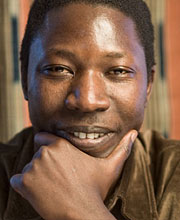 Dr. Fallou Ngom’s current research interests include the interactions between African languages and non-African languages, the Africanization of Islam, and Ajami literatures—records of West African languages written in Arabic script. He hopes to help train the first generation of American scholars to have direct access into the wealth of knowledge still buried in West African Ajami literatures, and the historical, cultural, and religious heritage that has found expression in this manner. Another fascinating area of Dr. Ngom’s work is language analysis in asylum cases, a sub-field of the new field of forensic linguistics. His work in this field addresses the intricacies of using knowledge of varied West African languages and dialects to evaluate the claims of migrants applying for asylum and determine if the person is actually from the country that he or she claims. Dr. Ngom’s work has appeared in the International Journal of the Sociology of Language, Journal of Multilingual and Multicultural Development, Language Variation and Change, and African Studies Review, among others.
Dr. Fallou Ngom’s current research interests include the interactions between African languages and non-African languages, the Africanization of Islam, and Ajami literatures—records of West African languages written in Arabic script. He hopes to help train the first generation of American scholars to have direct access into the wealth of knowledge still buried in West African Ajami literatures, and the historical, cultural, and religious heritage that has found expression in this manner. Another fascinating area of Dr. Ngom’s work is language analysis in asylum cases, a sub-field of the new field of forensic linguistics. His work in this field addresses the intricacies of using knowledge of varied West African languages and dialects to evaluate the claims of migrants applying for asylum and determine if the person is actually from the country that he or she claims. Dr. Ngom’s work has appeared in the International Journal of the Sociology of Language, Journal of Multilingual and Multicultural Development, Language Variation and Change, and African Studies Review, among others.
Event will be held in the library at the Boston University Elie Wiesel Center for Jewish Studies (147 Bay State Road Boston, MA 02215) on Thursday, February 15th from 5:00-6:30. All interested faculty, graduate and undergraduate students are encouraged to attend.
Spring 2018 Schedule:
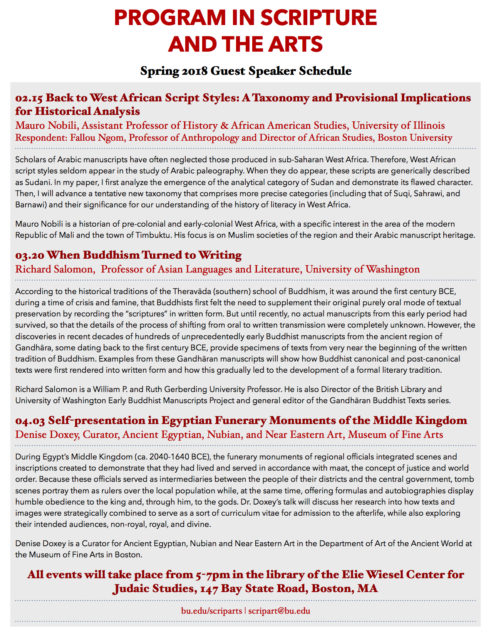
Pure Words from the Water: Haudenosaunee Uses of Wampum
Friday, October 13th, 5:00-7:00pm: Professor Philip P. Arnold
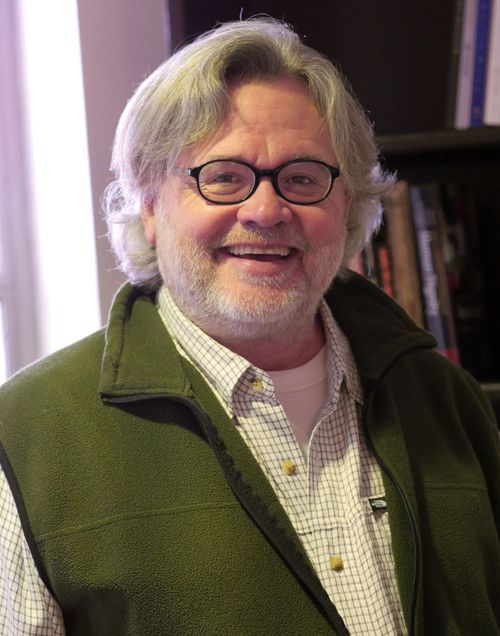
Philip P. Arnold is Associate Professor and Chair of Religion Department at Syracuse University as well as core faculty in Native American and Indigenous Studies. He is the Director of the Skä·noñh—Great Law of Peace Center (www.skanonhcenter.org/). His books are Eating Landscape: Aztec and European Occupation of Tlalocan (1999); Sacred Landscapes and Cultural Politics: Planting a Tree (2001); The Gift of Sports: Indigenous Ceremonial Dimensions of the Games We Love (2012) and Urgency of Indigenous Religions (University of New Mexico Press, forthcoming). He is a founding member of Neighbors of the Onondaga Nation (NOON), (www.peacecouncil.net/NOON/index.html) and established the Doctrine of Discovery Study Group (www.doctrineofdiscovery.org) He is the President of the the Indigenous Values Initiative (www.indigenousvalues.org), a non-profit organization to support the educational work of the Skä·noñh—Great Law of Peace Center.
Professor Arnold will be presenting on his latest work, entitled “Pure Words from the Water: Haudenosaunee Uses of Wampum”. The Haudenosaunee (Iroquois) have used wampum for millennia. It is connected with the founding events of the “Great Law of Peace,” which took place in what is now known as Central New York. This epic story depicts how the 5 warring nations (Mohawk, Oneida, Onondaga, Cayuga, and Seneca) came together in peace at Onondaga Lake (near Syracuse) through the use of wampum in condolence ceremonies established by the Peacemaker for Hiawatha and the Tadodaho. Wampum is used in strings and belts from the time of the Peacemaker until today and is understood to denote a purity of intention in speech, because of its relationship with water. It has been an important feature of the Haudenosaunee treaty relationships with European and American governments.
Flyer to come. Event will be held in the library at the Boston University Elie Wiesel Center for Jewish Studies (147 Bay State Road
Boston, MA 02215) on Friday October 13th from 5:30-7:30. All interested faculty, graduate and undergraduate students are encouraged to attend.
Seasonal Gods and Cosmic Kings: The Politics of Belief on a Classic Maya Lintel
Wednesday, November 1st, 5:00-7:00pm: Professor Stephen Houston
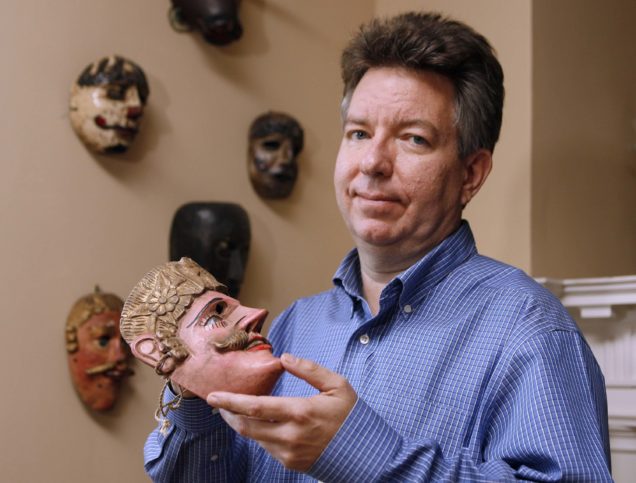
Stephen Houston serves as the Dupee Family Professor of Social Sciences at Brown University, where he also holds an appointment in Anthropology. A specialist in Classic Maya civilization, writing systems, and indigenous representation, Houston is the author of many books and articles, including, most recently, Temple of the Night Sun (Precolumbia Mesoweb Press), The Maya (with Michael Coe, now its 9th edition), and The Life Within: Classic Maya and the Matter of Permanence (Yale University Press), winner of a PROSE Award in 2014. He was co-curator, too, of a major show, Fiery Pool: The Maya and the Mythic Sea, which was exhibited at the Peabody-Essex Museum, the Kimbell, and the St. Louis Museum of Fine Arts. Houston has been honored with a MacArthur, along with fellowships and grants from the Guggenheim Foundation, the National Science Foundation, Dumbarton Oaks, the Clark Art Institute, and the National Endowment for the Humanities; he has also been the Ailsa Mellon Bruce Senior Fellow at the Center for Advanced Study in the Visual Arts, National Gallery of Art. His current projects concern the central role of young men in Classic Maya text and image, the lives and roles of Maya sculptors, and reports on two large-scale excavations, one at the great dynastic center of Piedras Negras, Guatemala, the other, El Zotz, in the same country. In recognition of Houston’s scholarship, the President of Guatemala awarded him, in 2011, the Grand Cross of the Order of the Quetzal, that country’s highest honor. For that same body of work, Houston also received the Tatiana Proskouriakoff Award in 2013 from the Peabody Museum, Harvard University. He is a summa cum laude graduate of the University of Pennsylvania; his Ph.D., awarded in 1987, is from Yale.
Professor Houston’s work, entitled “Seasonal Gods and Cosmic Kings: The Politics of Belief on a Classic Maya Lintel” covers a set of monuments that graft Maya dynastic politics onto concepts of sun, moon, seasons, and other solar patterns. Among the most potent images in the Maya world are those that fuse dynastic needs with mythic verities. Kings and nobleman come to discharge, or are seen to discharge, roles and duties set in the remote past. Expansive beings, the gods themselves, undertake tasks that humans can emulate. Through deity impersonation, those same people become one with supernatural figures. A compact illustration of these themes is a set of lintels taken over 50 years ago from what is now the Republic of Guatemala. For the most part, the carvings have languished in obscurity, only to re-emerge, after decades, in the recent past. A fresh set of images and technical assays permits a re-examination of their content, in sculptures commissioned for an unknown site under the control of the kingdom of Yaxchilan, Mexico. One carving in particular, to be studied closely here, grafts the supernatural and the political in a work that exemplifies Classic Maya fusions of identity. In doing so, it engenders a sense of inevitability, likening dynastic statecraft, hierarchy, and acts of building to the cosmic order of gods.
Flyer to come. Event will be held in the library at the Boston University Elie Wiesel Center for Jewish Studies (147 Bay State Road
Boston, MA 02215) on Wednesday, November 1st from 5:30-7:30. Reception will follow in the Boardroom of the Elie Wiesel Center. All interested faculty, graduate and undergraduate students are encouraged to attend.